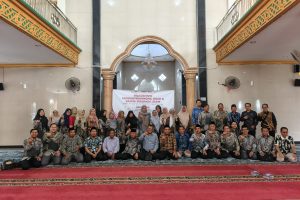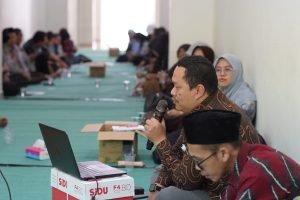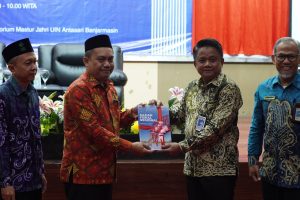
The Role of Universities in the Development of Islamic Economics
On the eve of opening of semester lectures, Faculty of Economics and Islamic Business (FEBI) UIN Antasari organized an International Webinar on ‘the Role of Universities in the Development of Islamic Economics in Malaysia’.
The key speaker at the occasion were Prof. Dr. Hassanuddeen Abd Aziz, Dean of Kulliyyah of Economics and Management Science, International Islamic University Malaysia, Gombag, Malaysia. FEIB UIN Antasari lecturer Dr Zaki Mubarak presided over the Webinar.
Vice Rector Dr Hamdan in his opening address stressed on equipping the teachers as demanded under new government policies and added that it becomes necessary to evaluate the qualities of a teacher in the society.
He said that a well equipped teacher can transform information into knowledge and knowledge into policy.
Prof. Hassanuddeen, in his keynote address emphasized on the reformative role of universities in the fast changing world order. “It cannot be denied that Universities as Centers of Education play an important role in enhancing and enriching a certain discipline,” said Prof Hassanuddeen.
Even before the formal acceptance of Islamic Economics, the Malaysian experience with Islamic Economics and institutions goes way back to the 1960s.
To enhance Islamic Economics at tertiary levels, education based on ‘Islamic Principles (The Islamization of knowledge’ including Islamic Economics, Banking and Finance and Islamic Accounting were taught in the Kulliyyah of Economics and Management Sciences (KENMS), IIUM which was officially opened on May 1983, joint sponsored by OIC and 8 sponsoring governments.
“IIUM is a comprehensive university. To date IIUM has produced thousands of students in various levels of bachelor, Master and Doctorate degrees”, he said.
Referring to the present challenges, he highlighted the role of university to read the minds of society.
He added, “the Universities in Malaysia is sought after as it meets the demand-driven needs in the Muslim World today in Islamic Economics and Islamic Banking and Finance.”
He maintained that the skills instill are critical judgment (analyzing ideas, reviewing literature, formulating pertinent comments), analytics (understanding and solving problems, making and analyzing logical arguments), application seeing practical implications of abstract ideas, analyzing real-world policies and processes), mathematics (constructing and analyzing proof, manipulating mathematical abstractions) computation, communicating and creativity.
“In our endeavor, we cannot rest on our laurels a lot more need to be done by universities in enhancing Islamic economics to be accepted as the mainstream,” said Prof Hassanuddeen.




